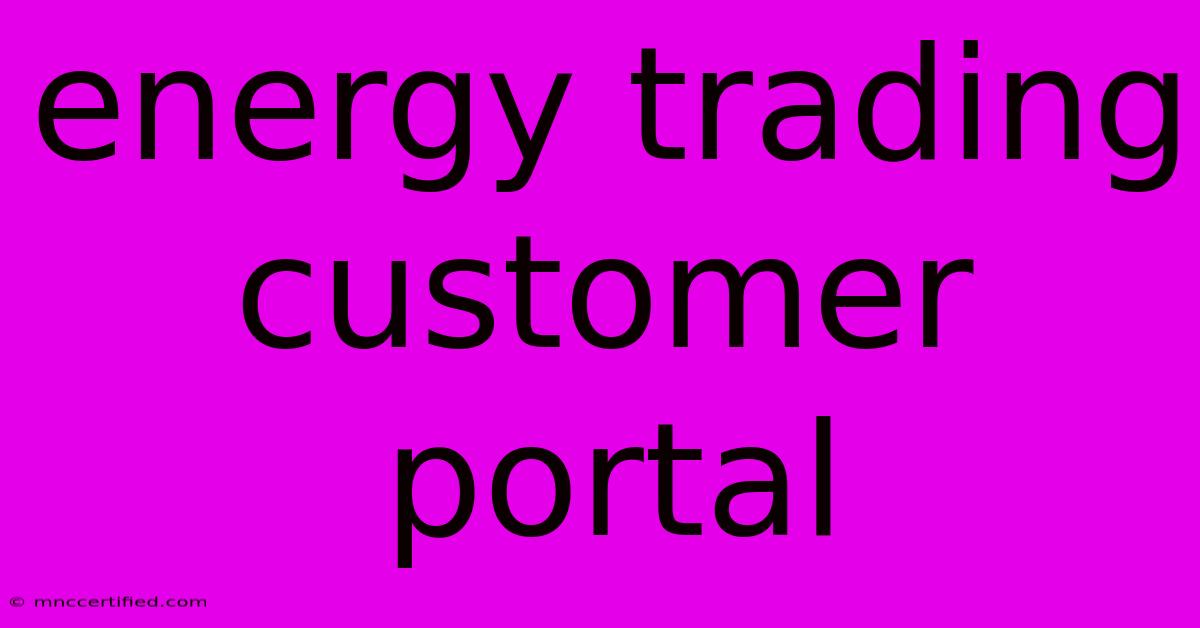Energy Trading Customer Portal

Table of Contents
Navigating Your Energy Trading Customer Portal: A Comprehensive Guide
The energy trading landscape is complex, demanding efficient management of contracts, portfolios, and market data. This is where the energy trading customer portal comes in. These online platforms are designed to streamline your interactions with energy suppliers, providing a centralized hub for all your trading activities. This guide will explore the key features, benefits, and best practices for effectively utilizing your energy trading customer portal.
Understanding the Benefits of an Energy Trading Customer Portal
A well-designed energy trading customer portal offers numerous advantages, significantly improving operational efficiency and reducing administrative overhead. Key benefits include:
- 24/7 Access: Manage your energy trading activities anytime, anywhere, eliminating geographical and time zone limitations.
- Real-Time Data: Access up-to-the-minute market information, portfolio updates, and contract details. This allows for informed decision-making and proactive risk management.
- Automated Processes: Streamline tasks such as trade confirmation, invoice processing, and reporting, saving valuable time and resources.
- Improved Collaboration: Enhance communication and collaboration with counterparties, brokers, and internal teams through integrated communication tools.
- Enhanced Security: Secure access controls and robust encryption protocols protect sensitive data from unauthorized access.
- Reduced Operational Costs: Automation and efficiency gains translate to significant cost savings in the long run.
- Better Reporting and Analytics: Generate customized reports and analyze performance data to identify trends and optimize trading strategies. This often includes portfolio management tools and risk management dashboards.
- Simplified Compliance: Many portals assist with regulatory reporting, simplifying compliance with industry standards.
Key Features of a Modern Energy Trading Customer Portal
Effective energy trading portals typically incorporate the following functionalities:
- Trade Execution & Management: Capabilities to execute trades, manage orders, and track their status from initiation to settlement.
- Portfolio Management: A comprehensive view of your energy portfolio, including positions, exposures, and valuations.
- Contract Management: Centralized storage and management of all energy contracts, including details on pricing, volume, and delivery schedules.
- Invoicing & Payment: Access to invoices, payment history, and online payment options.
- Reporting & Analytics: Tools for generating custom reports, analyzing trading performance, and visualizing key metrics. This could include features like price forecasting tools integrated with market data.
- Communication & Collaboration: Secure messaging systems for communication with counterparties and internal teams.
- Regulatory Reporting: Assistance with regulatory reporting requirements, ensuring compliance with relevant regulations.
- Customer Support: Access to online help resources, FAQs, and contact information for customer support.
Maximizing the Value of Your Energy Trading Customer Portal
To fully leverage the power of your energy trading customer portal, consider these best practices:
- Regular Training: Ensure your team receives proper training on the portal's functionalities and features.
- Data Validation: Regularly verify the accuracy and completeness of the data within the portal.
- Security Best Practices: Adhere to strong password policies and other security measures to protect your data.
- Feedback & Improvement: Provide feedback to your energy supplier on areas for improvement.
- Integration with Other Systems: Explore opportunities to integrate the portal with other systems to further streamline workflows.
Choosing the Right Energy Trading Customer Portal
When selecting an energy trading customer portal, consider factors such as:
- Functionality: Ensure the portal offers the features you need to manage your trading activities effectively.
- User-Friendliness: The interface should be intuitive and easy to navigate.
- Security: The portal should offer robust security measures to protect your data.
- Scalability: The portal should be able to scale to meet your future needs.
- Customer Support: Ensure the provider offers responsive and reliable customer support.
The energy trading customer portal is a vital tool for navigating the complexities of the energy market. By understanding its features, benefits, and best practices, you can significantly enhance your operational efficiency, reduce costs, and improve decision-making. Choosing the right portal and optimizing its use are crucial steps towards success in today's dynamic energy landscape.

Thank you for visiting our website wich cover about Energy Trading Customer Portal. We hope the information provided has been useful to you. Feel free to contact us if you have any questions or need further assistance. See you next time and dont miss to bookmark.
Featured Posts
-
East India Trading Company Box
Nov 28, 2024
-
Vpr Cast Reacts Lala Andy Ariana
Nov 28, 2024
-
Putnam Investments Stock Price
Nov 28, 2024
-
Lana Del Rey 2025 Tour Ticket Prices And Dates
Nov 28, 2024
-
Hunger Games Trading Cards Box
Nov 28, 2024